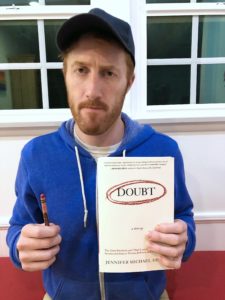 The history of doubt is as long as the history of thought itself, beginning with the birth of philosophy. As long as human beings have questioned their surroundings they have had doubt in their minds. One of the first was Socrates. He believed that “there is truth to be found, but that human beings may best approach it through doubt rather than conviction.” The ‘socratic method’ is the search for truth via the process of questioning. Questioning something means that you are skeptical of it, or that you doubt some element of it, and this questioning (hopefully) leads to understanding and wisdom.
The history of doubt is as long as the history of thought itself, beginning with the birth of philosophy. As long as human beings have questioned their surroundings they have had doubt in their minds. One of the first was Socrates. He believed that “there is truth to be found, but that human beings may best approach it through doubt rather than conviction.” The ‘socratic method’ is the search for truth via the process of questioning. Questioning something means that you are skeptical of it, or that you doubt some element of it, and this questioning (hopefully) leads to understanding and wisdom.
Along for the historical ride with philosophical doubt is also religious doubt, the two eternally and conceptually intertwined. People have always questioned the existence of a god or gods and have done so in fantastically myriad ways over the millennia. Xenophanes (born 570 BC) was one of the earliest Skeptics, writing that if cattle and horses and lions could paint, “they would depict the gods in their own image.” He noted that Ethiopians described the gods as black and flat-nosed, while the Thracians described them with blue eyes and red hair. Who is correct? Is anybody?
All of the great religions are wracked with doubt in their own ways. With Christianity, managing one’s doubt, that is, husbanding one’s faith, is the central drama. The story of Job is a story of doubt. In the Gospels of both Mark and Matthew, Jesus’ last words were “My God, my God, why have you forsaken me?” Even Jesus doubted.
Jewish and Islamic doubt have also existed throughout the history of mankind. Al-Ghazali (1058-1111) is one of Islam’s greatest philosophers and considered a great religious thinker by many Muslims. He noted that “Christian youths always grew up to be Christians, Jewish youths to be Jews and Muslim youths to be Muslims.” So what is belief? (For a taste of Jewish doubt, answer me this: How could Moses could have written the book of Dueteronomy when it tells of his own death?)
In eastern cultures, Buddhism has been around since Guatama Buddha walked the earth somewhere around the 5th century BC. Buddhism is the search for Enlightenment and the attainment of Nirvana via the transcendence of the self. Doubt in the existence of the self is central. In fact, it is this belief in the self that Buddhism believes leads to suffering. The answer is to let go of all certainty. Buddhist thought has disseminated into a variety of other ideologies, a popular one being Zen, which focuses on self-restraint, meditation, and understanding the nature of the mind. In Zen they have a saying: “Great doubt: great awakening. Little doubt: little awakening. No doubt: no awakening.”
I could go on with more examples of doubt, from east to west, ancient to modern, slightly skeptical to full-blown atheist, but that would be redundant. As long as there have been believers, there have been doubters. What is interesting, however, is that while believers held the power in their societies for most of human history, only recently have the tables turned and doubters come to the forefront. It is no coincidence that here in the United States, the greatest democratic country our modern world has ever seen, we have a separation of church and state. Any person can practice whichever religion they desire, but matters of social governing are done in a secular manner, the goal of which is the prosperity of everyone. This change in history, now seeing doubters and atheists in power, has come about due to scientific discoveries and technological advances. Once upon a time people thought the gods were responsible for rain. Now we know that rain is a part of nature’s natural cycles, and we don’t need a god to help us understand it. Science and technology have brought the United States virtual reality and electric cars, while other countries (still dominated by religious certainty) still fail to educate their women and treat them equally.
Cicero (born 106 BC) wrote “by doubting we come at truth.” Freud (born 1856 AD) wrote that “the healthy psyche needs doubt, indeed should embrace disbelief as a part of maturity.” From the earliest thinkers to the most recent, doubt has always been a recurring theme, and while humanity has undoubtedly come a long way, we still face the persecution of certainty. This is because certainty is comfortable, and people desire comfort. Doubt is intrinsically unstable and chaotic, feelings we naturally want to assuage.
In conclusion, if you harbor doubts about your life, you are not alone. In fact, you are in good company, perhaps some of the greatest. Buddha, Socrates, Cicero, Epicurus, Aristotle, Jesus, Marcus Aurelius, Spinoza, Montaigne, Nietzsche, Locke, Hume, Hobbes, Sartre, Newton, Galileo, Jefferson, Franklin, Edison, Einstein, and Freud were all doubters. Personally, I believe that when feeling doubt one should also feel pride, for doubt is the seed of truth, and the search for truth is always good.


Leave a Reply